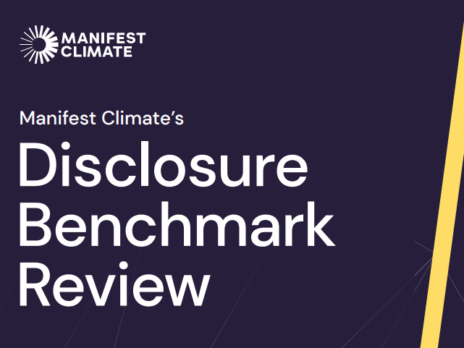

The first step towards recovery is acknowledging one has a problem. An increasingly shared recognition of the significant business risks the climate crisis entails suggests the corporate sphere has completed this significant stride. Net-zero commitments are becoming commonplace, sustainability experts are in huge demand and climate is an issue being regularly discussed at the highest level of corporate governance.
But acknowledgment is often the easy part. The journey beyond requires a seismic shift in leadership mindset, competency, culture and cross-functional collaboration. Moving past bold statements of intent into making climate a central strategic driver is also dependent upon understanding the right questions to ask (and who should be asking them). For Laura Zizzo, CEO and co-founder of Manifest Climate, this remains an area where a number of leadership teams must quickly level up.
“I think professional service providers have traditionally done their clients a disservice in this regard,” Zizzo says. “We knew this was a problem, but the business model was to answer their questions, not empower clients to ask the right ones.
“For too long those questions weren’t coming from a business-risk and core strategy perspective, despite it being increasingly evident that every business would be impacted by transition and adaptation. Now they’re feeling that impact, but lacking the expertise to respond and rethink how they do business in a more climate-aware way.”
With climate traditionally siloed in the sustainability function, moving it to the core of one’s business is no easy feat. The C-suite is under growing investor and regulatory pressure to do this at speed, but questions remain about the extent to which senior leadership is taking ownership of the challenge.
“Professional service providers have traditionally done their clients a disservice. We knew this was a problem, but the business model was to answer their questions, not empower clients to ask the right ones.”
Sustainability teams are more used to articulating environmental targets and performance in the language of marketing communications and are under increasing pressure to answer fundamental business questions. For Zizzo, this highlights the need for climate competency to rise across all functions, starting in the boardroom.
“We typically still see this either being done by committee, where nobody really owns it, or an individual being given sole responsibility, enabling everybody else to think it’s not their problem,” she explains. “In truth, you need to be able to do both those things well; ensure you have that committee overview, but also appoint somebody as a throat to choke within the organisation.”
No easy answers for climate competency
Leadership and ownership are themes the Manifest Climate CEO returns to time and again. For Zizzo, competency should not be confused with expertise. Hiring a climate expert onto one’s board may not even be necessary; it’s far more important that everyone in governance sees climate as a fundamental factor in decision making and has an appreciation of how it impacts the questions they need to ask.
“They have to think about this in the way they would any other huge transformational business risk,” Zizzo says. “In that scenario, a board wouldn’t simply ask a consultant to give them a checklist of action points. They would get a working group together, have strategy sessions, really think deeply about where this journey is taking them. That’s where they need to get to on climate.
“Too often, they still just want to be told what to do. Unfortunately, that’s not possible; this is far too complex for that. What we’re trying to do is empower them to take ownership – highlighting best practice, prioritising essential insights, accelerating their capability to extract decision-useful information that can help position climate at the heart of business strategy.”
Manifest Climate was born out of Zizzo’s experience in climate law and consultancy, and a recognition of the need to scale the reach and impact of strategic climate services. Underpinned by climate experts, the platform leverages machine learning algorithms to surface best practices, generate disclosure reviews, and deliver recommendations at speed.
This helps address the skills shortage within the climate space, while also empowering the experts one does have in-house to turn their attention away from compliance to broader strategic goals. “We see organisations wasting limited brainpower, asking specialists to count carbon to the exact degree,” Zizzo says. “They should be addressing this challenge at a macro level, rather than being pulled into the minutiae.”
Seeing the big picture
Putting numbers before nuance speaks to a lingering lack of confidence surrounding the climate agenda. For Zizzo, the issue is less challenging than corporate leadership often makes it out to be – we need to end fossil fuel dependence and accelerate the journey to net zero – but there remains “a cognitive dissonance”, with boardrooms intimidated by the size of the climate space and complexity of climate science.
“Too often, businesses still just want to be told what to do. Unfortunately, that’s not possible; this is far too complex for that.”
This lack of confidence is reflected in an emphasis on precision that threatens to undermine progress. “There’s still an attitude that a lack of data or certainty prevents decision making,” Zizzo says. “That makes no sense to me. There are so many other business-critical areas which are not dependent on absolute exactness, where slight gaps don’t call into question overall credibility. It is an issue that still stops leadership from embracing climate as a business-critical issue and needs to be overcome.”

One way of engendering such cultural change is educating businesses on what their competitors are doing well – “I learned early on in my days as a consultant that this was the best way of getting leadership to take notice,” Zizzo says with a chuckle. This is something internal sustainability teams are already doing, albeit manually. One of Manifest Climate’s great value propositions, the CEO says, is the ability to perform the task at greater speed, depth and scale.
“We know what to look for and we can do it far faster than you,” Zizzo says. “Also, we can help you look beyond your peer group, providing a cross-sectorial view. For example, everyone can learn from Shell linking executive compensation and climate targets. We’ll pull out best practices across industries and also show you how you compare to your peers in a way that hopefully helps you move faster. We call it our ‘climate action accelerator’; shining a light on what others are doing can inspire a greater sense of competition in the market.”
In addition to accessing the experiences of others, the capability to better tell one’s own climate story is an essential component of this journey. Published in November 2022, Manifest Climate’s Disclosure Benchmark Review, an in-depth assessment of the quality of private sector climate disclosures across more than 3,000 organisations in 65 countries, made for interesting reading in this regard. While highlighting greater disclosure rates across all sectors, a deeper review of these disclosures suggested that less than half could be defined as “decision-useful”, failing to “provide the clarity needed to make effective investment decisions”.
While heartened by the growing alignment with TCFD highlighted in the report, Zizzo believes the discrepancy reveals an ongoing lack of confidence and fear of transparency within this space. “Much of our impetus is empowering businesses to tell their climate story aligned with regulatory requirements and investor expectations, getting comparability and consistency around how these things are discussed in the market and embedded into financial disclosures,” Zizzo begins.
“This often requires a real shift from a reporting perspective – you’re no longer looking to get this out in the form of a brochure. There are some leaders producing really valuable, decision-useful information, but much of it remains quite boilerplate. That’s not going to move the needle. For a number of disclosure committees bringing this into the financial, they’re still worried about saying too much. We want them to know it’s okay to tell the truth – even to be uncertain. Honesty is more credible than not saying much at all.”
Accelerating the competency journey
Embracing uncertainty can be a big ask, but Zizzo points to the fact that nobody yet has this fully figured out. In a space that remains in its relative infancy, what credibility looks like still requires better definition and refinement. But we will see rapid strides made soon, with ongoing upskilling and greater use of technology driving progress – “It can’t be individuals hitting CTRL+F through disclosure documents anymore; we need to build in technology to move faster,” Zizzo insists.
“We want [leaders] to know it’s okay to tell the truth – even to be uncertain. Honesty is more credible than not saying much at all.”
Indeed, despite many leadership teams still coming to terms with how to position climate at the heart of strategic decision making, and our time frame in which to address the climate crisis rapidly shrinking, Zizzo sees plenty of reasons for optimism. While acknowledging that decades-long disinformation campaigns have stymied progress, she insists that debates evident across the media landscape are no longer reflected in the boardroom, with even the greatest sceptics recognising they cannot ignore market headwinds.
There is also hope to be drawn from how climate commitments have withstood the recent economic downturn, with the transition now an integral part of the wider conversation around response and recovery.
“I’ve been doing this a long time and, in previous cycles, people cared about climate until we entered a downturn and, suddenly, they didn’t,” says Zizzo. “Now we’re seeing the need for transition being directly linked to some of the macro issues causing this economic strife – an overdependence on Russian gas, for example. It’s such an interesting time in history because we’re finally seeing the needs for economic and climate action converge.”
What is true at a macroeconomic level is also true in the boardroom. Economic and climate commitments can no longer be seen as individual goals and separate responsibilities. The C-suite has taken that first step of recognising it has a climate problem, now business leaders must acquire the tools and build the competencies to ensure their responses sit at the heart of strategic decision making.







